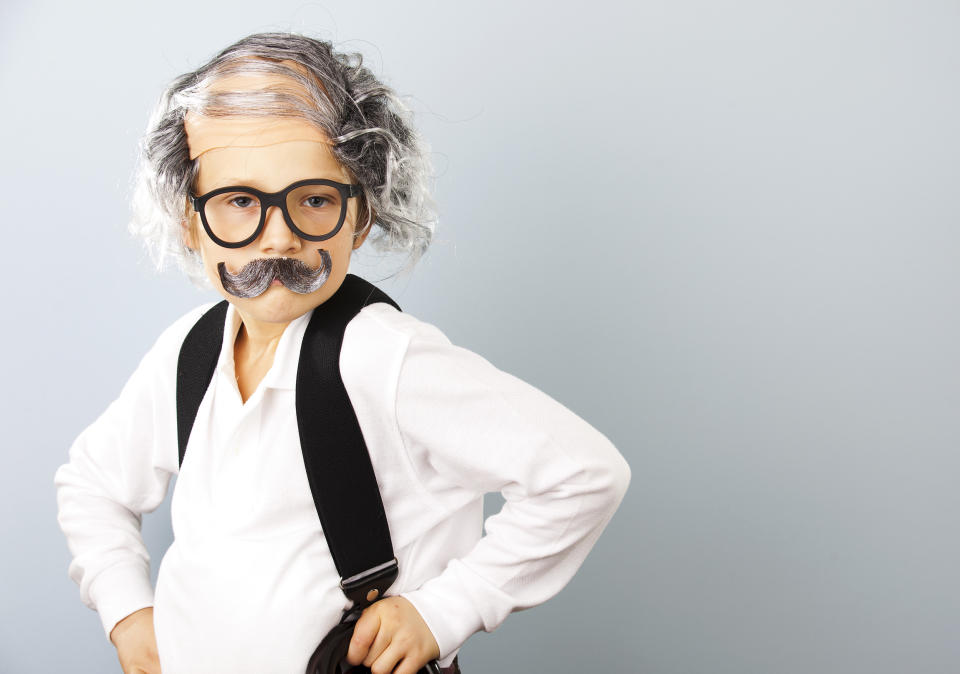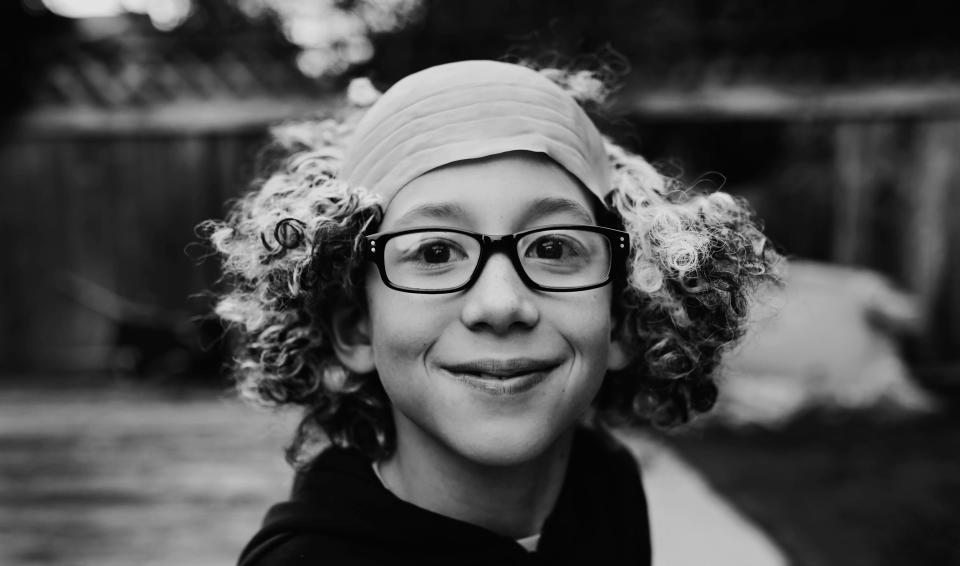Dressing up as 'old' for Halloween? Here's why to reconsider.
Demeaning.
That’s what Bette Ann Moskowitz thought when she saw a Pinterest photo of a child dressed up as "old" for a 100th-day school celebration, complete with a walker and tennis balls.
“There were instructions from parents. You could make her look just like an old lady — all you have to do is put the wrinkles on,” Moskowitz told TODAY.
A former ombudsman for long-term care patients and the author of the book “Finishing Up: On Aging and Ageism,” Moskowitz said that dressing up as old for Halloween, or any other occasion for that matter, is not only belittling but represents the kind of casual ageism found in nearly every corner of society.

“What bothers me so much is that I believe that ageism, this kind of minor treatment, is the gateway drug to real ageism, to real elder abuse. This kind of minor stuff is just a stepping stone," she said.
By reducing older adults to caricatures, it perpetuates negative messaging associated with aging including things like disability, senility and incompetence, she said.
Moskowitz, 82, said that after conducting interviews on ageism for her book, she was surprised to discover that many of her similar-aged cohorts were unconcerned about things like “old” costumes, citing bigger worries to deal with.
She concluded that starting from a young age, we’re so saturated with negative messages around aging that not only have we become immune to them, we unconsciously perpetuate them, herself included.
Attending a play with her granddaughter, Moskowitz said that she was standing in the lobby of the theater when she commented that there were a lot of "gray-hairs" in the crowd.
"My granddaughter said, 'Does that bother you?'And I think it did because that's how I was raised. If it's a play for old people, how good could it be?" said Moskowitz.
“We are living in what I call a ‘cultural cage.' We don’t see the bars, but it is all around us," she said. "We don’t treat people any differently from the way we have learned to be treated.”
What's the big deal?
“Ageism is so ingrained in our culture that people don’t think about seeing a little kid dressed up as an older person as problematic," said Donna Fedus, gerontologist and founder of “Borrow My Glasses, an education company dedicated to redefining perceptions around aging.
"As a gerontologist, it concerns me that aging is mostly associated with being sick, being out of step, being not able to hear, being unable to walk, being unable to contribute, even when that is not the experience of aging from millions of people," Fedus said.
Yet, older adults are routinely mocked and diminished in ways most people don't even think about, including "old" greeting cards on store shelves, TV commercials ("I've fallen and I can't get up") and, of course, Halloween costumes.
And while it may seem harmless, the implications run deep.
"Ageism harms older adults and there's research to prove it," Fedus said.
From being less likely to be hired for a job to having medical concerns dismissed by doctors and other providers as just "old" problems, older adults face discrimination on a variety of fronts leading to financial loss and undiagnosed medical conditions.
"We know that people 50 and older are likely to be discriminated (against) in the workforce. Doctors and people in health professions are not trained to work with older people," Catherine Solomon, a sociology professor and program director of gerontology at Quinnipiac University, told TODAY.
"There are a lot of factors that go into how we view older people, and Halloween costumes are just part of that," Solomon said. And it's not just the costume but the costume within the bigger picture "in which ageism is still very prevalent."
Much like racism and sexism, there are real-life consequences stemming from ageism, said Fedus. "You can choose to keep those stereotypes going, but the thing about aging is everyone's destined for that stop if you're lucky enough to live that long."
More than our aversion to growing old, we’re also completely obsessed with being young.
“People think it’s a big compliment to be told they don’t look their chronological age,” said Fedus. “And every time I hear that I think, ‘They’re teaching ageism.’ They’re teaching young people to say you should be proud of not looking your age.”
And, according to Fedus, Halloween costumes and other messages that denigrate older adults only reinforce the notion that young is better.
“We don’t want to be older people. That’s not good,” she said, citing research that shows that people who have negative perceptions of aging live, on average, seven years less than those who don’t.
“That’s not just my opinion as a gerontologist; there’s 25 years of research that says ageism harms olders adults," said Fedus.
The bottom line

As cultural norms shift, so do attitudes. Many once-popular costumes are now viewed through the lens of cultural appropriation or deemed problematic for other reasons.
“We don’t dress up as those other things, so why is it OK to dress up as ‘old’ and perpetuate those stereotypes?” Solomon said.
Author Maya Angelou once remarked, “Do the best you can until you know better. Then when you know better, do better.”
Has the time come to do better and rethink the “old” costume?
“I think it’s something to pause and think about because age and being old is something that hopefully we will all be," Solomon said, and when that time comes, how will those stereotypes feel in light of everything we know about ageism?
"It concerns me that we only recognize aging when there's a negative," Fedus said. "If someone has an ache, pain or infirmity of some kind" — instead of for any of the positive benefits associated with age.
"We don't say 'I feel old' when we solve a problem, make a good decision at work based on decades of life experience, accomplish a goal or task efficiently because we've done it a million times before, or make a favorite recipe from memory," said Fedus.
What it boils down to is context, and if it looks like ageism, then it probably is.
"We wouldn't use disability as a costume — that would just be really offensive," Solomon said. "It's really important that we flip the script on aging and present a more positive, multifaceted view."
This article was originally published on TODAY.com

